Related Research Articles
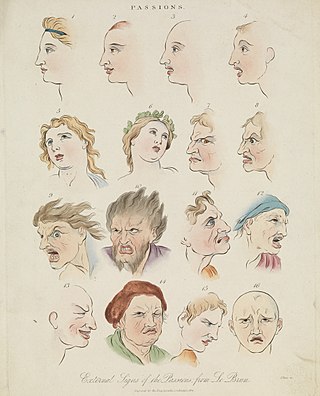
Emotions are mental states brought on by neurophysiological changes, variously associated with thoughts, feelings, behavioral responses, and a degree of pleasure or displeasure. There is no scientific consensus on a definition. Emotions are often intertwined with mood, temperament, personality, disposition, or creativity.
The Tea Party is a Canadian rock band. Active throughout the 1990s and up until 2005, the band re-formed in 2011. The Tea Party released eight albums on EMI Music Canada, selling over three million records worldwide, including four double-platinum awards, one platinum and four gold albums in Canada. Between 1996 and 2016, The Tea Party was the 35th best-selling Canadian artist in Canada.
Physiological psychology is a subdivision of behavioral neuroscience that studies the neural mechanisms of perception and behavior through direct manipulation of the brains of nonhuman animal subjects in controlled experiments. This field of psychology takes an empirical and practical approach when studying the brain and human behavior. Most scientists in this field believe that the mind is a phenomenon that stems from the nervous system. By studying and gaining knowledge about the mechanisms of the nervous system, physiological psychologists can uncover many truths about human behavior. Unlike other subdivisions within biological psychology, the main focus of psychological research is the development of theories that describe brain-behavior relationships.
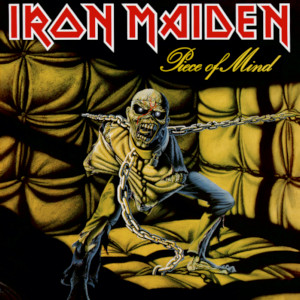
Piece of Mind is the fourth studio album by English heavy metal band Iron Maiden. It was released on 16 May 1983 in the United Kingdom by EMI Records and in the United States by Capitol Records. It was the first album to feature drummer Nicko McBrain, who had recently left the band Trust and has been Iron Maiden's drummer ever since.
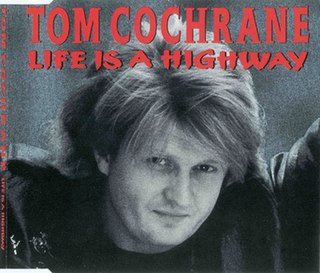
"Life Is a Highway" is a song by Canadian musician Tom Cochrane from his second studio album, Mad Mad World (1991). The song became a number-one hit in Canada in late 1991. "Life Is a Highway" also peaked at number six on the US Billboard Hot 100 chart in August 1992 and reached the top three in Australia and New Zealand the same year. The song was covered by Chris LeDoux for his 1998 album One Road Man and Rascal Flatts for the Cars soundtrack.
The cognitive revolution was an intellectual movement that began in the 1950s as an interdisciplinary study of the mind and its processes. It later became known collectively as cognitive science. The relevant areas of interchange were between the fields of psychology, linguistics, computer science, anthropology, neuroscience, and philosophy. The approaches used were developed within the then-nascent fields of artificial intelligence, computer science, and neuroscience. In the 1960s, the Harvard Center for Cognitive Studies and the Center for Human Information Processing at the University of California, San Diego were influential in developing the academic study of cognitive science. By the early 1970s, the cognitive movement had surpassed behaviorism as a psychological paradigm. Furthermore, by the early 1980s the cognitive approach had become the dominant line of research inquiry across most branches in the field of psychology.

Daniel Joseph Levitin, FRSC is an American-Canadian cognitive psychologist, neuroscientist, writer, musician, and record producer. He is the author of four New York Times best-selling books, including This Is Your Brain on Music: The Science of a Human Obsession, which has sold more than 1 million copies.

Stuart Chatwood, is a Canadian musician, best known as the bass guitar and keyboard player for the rock band The Tea Party. The Tea Party are known for fusing together musical styles of both the Eastern and Western worlds, in what they call "Moroccan roll". In 2001, Chatwood won a Juno Award for the best artwork for a Tea Party album. Stuart Chatwood is also a composer of video game soundtracks. He composed music that has appeared on the soundtracks for eight Prince of Persia games developed by Ubisoft Montreal: Prince of Persia: The Sands of Time (2003), Warrior Within (2004), The Two Thrones (2005), Battles of Prince of Persia (2005), Revelations (2005), Rival Swords (2007), Prince of Persia (2008), and The Fallen King (2008). The series has been very successful, selling in excess of ten million copies worldwide. He also composed the soundtrack for Darkest Dungeon (2016) and its sequel Darkest Dungeon II.

Tyler Volk is Professor Emeritus of Environmental Studies and Biology at New York University.

The Edges of Twilight is the third album by Canadian rock band The Tea Party, released in 1995. The album features many instruments from around the world, giving various songs a strong world music flavour in addition to the rock/blues influences evident in the band's earlier releases. Jeff Burrows explained that "basically we wanted to expand upon the initial idea that we tried on Splendor Solis, which was trying to incorporate different styles of world music into our music. So with this album we became more familiar with many more instruments. In our minds we were trying to do for a rock album what Peter Gabriel does to pop by infusing various cultures, percussion and exotic sounds into it."
Joseph E. LeDoux is an American neuroscientist whose research is primarily focused on survival circuits, including their impacts on emotions such as fear and anxiety. LeDoux is the Henry and Lucy Moses Professor of Science at New York University, and director of the Emotional Brain Institute, a collaboration between NYU and New York State with research sites at NYU and the Nathan Kline Institute for Psychiatric Research in Orangeburg, New York. He is also the lead singer and songwriter in the band The Amygdaloids.

Splendor Solis is the second album by Canadian rock band The Tea Party, released in 1993 as their first major label release on EMI Music Canada. The album sold very well in Canada, reaching #20 on the Canadian album chart and achieving platinum status in 1994 and earning a Juno nomination for Best Hard Rock Album. The band was also nominated for Best New Group.

Philosophy of mind is a branch of philosophy that studies the ontology and nature of the mind and its relationship with the body. The mind–body problem is a paradigmatic issue in philosophy of mind, although a number of other issues are addressed, such as the hard problem of consciousness and the nature of particular mental states. Aspects of the mind that are studied include mental events, mental functions, mental properties, consciousness and its neural correlates, the ontology of the mind, the nature of cognition and of thought, and the relationship of the mind to the body.
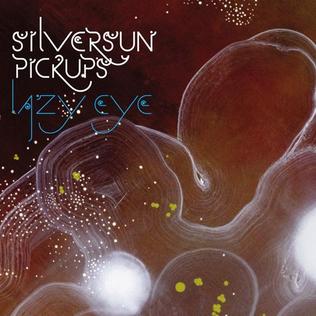
"Lazy Eye" is the first single from Silversun Pickups' debut album Carnavas, written by lead singer and guitarist Brian Aubert. The band performed the song on the Late Show with David Letterman, The Tonight Show with Jay Leno, Later With Jools Holland, and Last Call with Carson Daly. The song is a playable track on Rock Band 2 and Guitar Hero: World Tour.
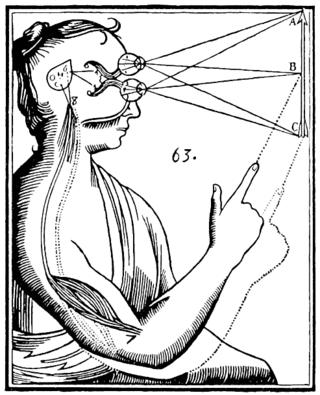
The mind–body problem is a philosophical problem concerning the relationship between thought and consciousness in the human mind, and the body.

Animal consciousness, or animal awareness, is the quality or state of self-awareness within an animal, or of being aware of an external object or something within itself. In humans, consciousness has been defined as: sentience, awareness, subjectivity, qualia, the ability to experience or to feel, wakefulness, having a sense of selfhood, and the executive control system of the mind. Despite the difficulty in definition, many philosophers believe there is a broadly shared underlying intuition about what consciousness is.

The Angry Samoans is an American punk rock band from the first wave of American punk, formed in August 1978 in Los Angeles, California, by early 1970s rock writer "Metal" Mike Saunders, his sibling lead guitarist Bonze Blayk and Gregg Turner, along with original recruits Todd Homer (bass) and Bill Vockeroth (drums).
Daniela Schiller is a neuroscientist who leads the Affective Neuroscience Lab at the Mount Sinai School of Medicine. She is best known for her work on memory reconsolidation, and on modification of emotional learning and memory.
Dual consciousness is a theoretical concept in neuroscience. It is proposed that it is possible that a person may develop two separate conscious entities within their one brain after undergoing a corpus callosotomy. The idea first began circulating in the neuroscience community after some split-brain patients exhibited the alien hand syndrome, which led some scientists to believe that there must be two separate consciousnesses within the brain's left and right hemispheres in competition with one another once the corpus callosum is severed.
Qualia Fest is a music festival founded by philosopher Richard Brown where various bands composed of philosophers of mind and neuroscientists perform music about consciousness and qualia.
References
- ↑ Heydarpour, Roja (2007-03-06), "A Band of Scientists Who Really Are a Band by Roja Heydarpour", The New York Times, retrieved March 6, 2007
- ↑ Cott, Jonathan; Rester, Karen (25 July 2007), Joseph LeDoux's heavy mental , retrieved July 25, 2007
- ↑ Heavy mental, archived from the original on 2010-02-23
- ↑ Jonathan Cott; Karen Rester (July 25, 2007). "Joseph LeDoux's heavy mental". Salon Media Group . Retrieved 29 December 2013.
- ↑ "Jonathan Cott". Contributor. Rolling Stone. Retrieved 29 December 2013.
- ↑ "Theory of My Mind (June, 2010)". The Amygdaloids. Retrieved 28 December 2013.
- ↑ Khamsi, Roxanne (16 April 2009), "Songs on the brain", Nature, 458 (7240): 835–836, Bibcode:2009Natur.458R.835K, doi: 10.1038/458835b
- ↑ Kaminer, Ariel (December 9, 2012). "Where Theory and Research Meet to Jam About the Mind". The New York Times . Retrieved January 27, 2015.